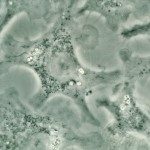Lien vers Pubmed [PMID] – 1288846
Can. J. Microbiol. 1992 Dec;38(12):1286-91
Using two-dimensional electrophoresis we have investigated the heat-shock response in a pathogenic fungus, Fonsecaea pedrosoi. Fungal cultures were transferred from 37 to 45 degrees C for either 30 or 90 min and then returned back to the initial temperature. Analysis of the total proteins resolved on two-dimensional gels indicated important changes in the accumulation of several peptides according to the duration of treatment and the temperature. The 30-min incubation at 45 degrees C resulted in the induction of several new proteins, whereas other proteins were either increased or decreased. These inductions and repressions of proteins (called heat-shock and heat-stroke proteins, respectively) were either specific to this time period or still present after a 90-min incubation. In addition, the 90-min incubation period led to the enhancement of several proteins, which were therefore called late heat-shock proteins to distinguish them from the early ones detected after 30 min. Finally, when cultures were shifted back to 37 degrees C most of the heat-shock proteins decreased or disappeared; in parallel, most of the heat-stroke proteins were reinduced at this time. These results are in good agreement with previous studies on the heat-shock response and provide additional evidence that this phenomenon is highly conserved among species.
